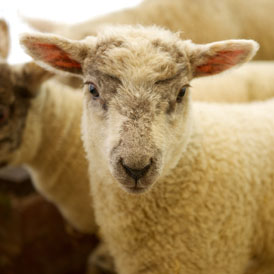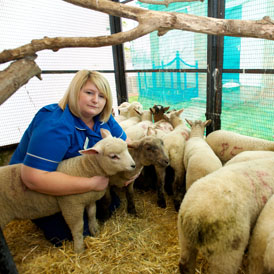Farmers fleeced by sheep thieves
A global shortage of meat has led to a massive increase in livestock rustling by organised criminal gangs, spelling trouble for the humble spring lamb.

In the latest case, West Midlands motorway police found 16 lambs after they stopped two cars on the M5.
In the first vehicle officers discovered eight lambs in the boot with another three on the back seat and in the second four lambs were found in the boot and one in the foot well. They had been tightly bound and were obviously distressed.
It was an unusual find for West Midlands police, who couldn’t resist calling it an ‘Un-bah-lievable discovery’ in their press release. But for farmers across the country it is not so funny, as this increasingly common crime is costing them millions of pounds every year.
Last year, the NFU recorded a five-fold increase in sheep rustling, in line with rocketing meat prices. They fear the trend will continue well into 2011 and beyond.
Nicola Whittaker from NFU Mutual – the body that insures thousands of farmers across the country – told Channel 4 News that “the pattern between global prices and theft is clear. If lamb prices go up, which they have done this year, we see more lamb thefts.”

“Historically livestock has always gone missing, but now it’s on a much larger scale” she added.
The weak pound means many sheep are being exported, while traditional sellers such as New Zealand, have produced less lamb because of drought, and much of what they do produce goes to satisfy demand in the Far East. This has helped to push up the prices at home and make sheep rustling a lucrative business.
In 2009, when there were relatively few cases of sheep rustling, the price of a kilo of lamb was £2.79. During 2010 a kilo of lamb increased to £4 and thefts soared. The price now stands at £4.54 per kilo, and is reflected in the spate of recent thefts around the country.
Last month 70 lambs with an estimated value of between £10,000 and £15,000 were stolen from a field near Garstang.
That followed one of the biggest-ever incidents when 300 sheep were stolen in the Lothian and Border areas of Scotland.
“If security is not stepped up, it could be a very difficult year in terms of rural crime this year.” Nicola Whittaker, NFU Mutual
Ed Bedington, editor of the trade website Meat info, told Channel 4 News: “It will continue, farms are easy targets with little security in a vast countryside, with large open areas that are difficult to police.”
He attributes small thefts to opportunists, but believes the larger thefts are the work of organised gangs with expert knowledge and techniques.
Nicola Whittaker says that, while it is difficult to verify if much of the meat ends up abroad or sold to domestic markets, it is considerably easier to track the whereabouts of farm machinery:
“Very organised gangs have targeted high end tractors to satisfy huge demand in the Third World. With the tracing technology we have, many of these tractors have been located in Australia, Asia, Africa, and elsewhere”
In 2009, 254 tractors – many of them costing more than £100 000 each – were stolen. But during 2010 that figure shot up to nearly 2,000 tractors stolen.
And it doesn’t stop at agricultural equipment, the high global price of oil has caused a 264 per cent increase in the theft of heating oil in farms this year.
“If security is not stepped up, it could be a very difficult year in terms of rural crime this year,” she concludes.